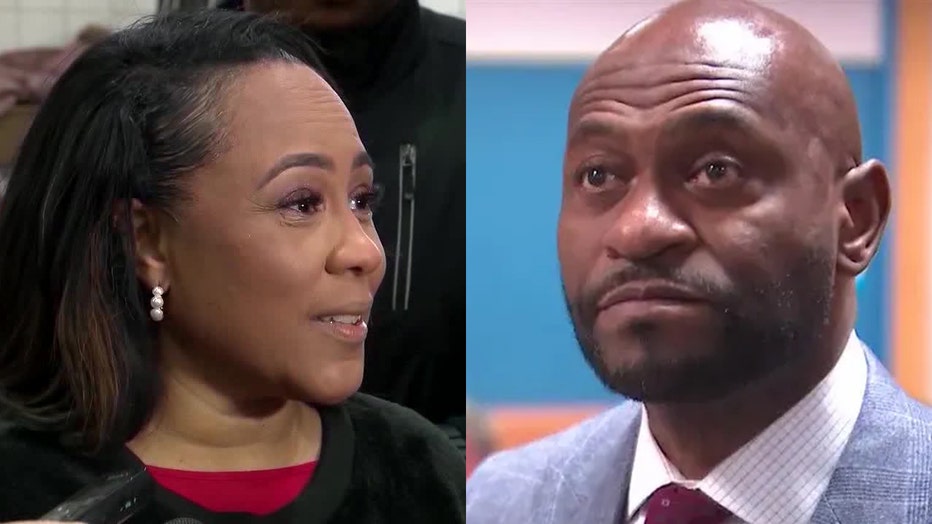Fulton DA Fani Willis urges court to dismiss Trump’s disqualification bid in new brief
FULTON COUNTY, Ga. - The Fulton County District Attorney's Office and State of Georgia is asking the Georgia Court of Appeals to allow their election interference case against former President Donald Trump and his co-defendants to move forward.
A Brief of Appellee was filed by Fulton County District Attorney Fani Willis on Aug. 5.
According to the brief, the appellants argued that Willis had a personal interest in the case, which created a conflict of interest, and that her public statements and relationship with a special prosecutor demonstrated an appearance of impropriety. The trial court rejected these arguments, finding no actual conflict of interest and determining that any appearance of impropriety was adequately addressed by the withdrawal of the special prosecutor.
The brief from the State argues that the trial court acted within its discretion, emphasizing that the appellants failed to provide sufficient evidence of an actual conflict of interest or any improper personal gain by Willis. The brief also contends that the trial court's decision not to disqualify Willis should be upheld because the appellants’ arguments are based on speculative or unsubstantial evidence.
Willis is now urging the appellate court to affirm the trial court's ruling. The brief stresses that disqualification is a serious and rare remedy that should only be applied when there is clear evidence of a conflict of interest or bias, which the appellants failed to demonstrate.
Former President Trump and 18 allies were indicted on Aug. 14, 2023, on 41 felony counts relating to a conspiracy to unlawfully change the outcome of the 2020 presidential election.
Georgia election probe timeline: From November 2020 to August 2023
On Jan. 8, 2024, defendant Michael Roman filed a motion to dismiss the indictment and disqualify Willis, her office, and special prosecutor Nathan Wade because of an "improper" relationship between Willis and Wade.
The trial court held a dramatic evidentiary hearing featuring Willis, Wade, a former friend and colleague of Wade's, Willis' father, and a former employee of Willis on Feb. 15, 16, and 27. The trial court heard closing arguments on March 1, and on March 15, Fulton County Superior Court Judge Scott McAfee ruled that although the relationship did not lead to an actual conflict of interest, it did create "an appearance of impropriety," and Willis or Wade would need to step aside in order for the Fulton County DA's Office to remain involved. A few hours later, Wade resigned.

Fani WIllis and Nathan Wade (FOX 5)
On March 18, the defendants submitted a joint motion for a Certificate of Immediate Review, which was granted the next day by the trial court. On March 28, they filed their Application for an Interlocutory Appeal. That appeal was granted by the Superior Court on May 8. On July 16, the Georgia Court of Appeals announced that it would hear oral arguments for the appeal on Dec. 5.
The brief details how Willis and Wade met, how Wade was hired and paid, the couple's relationship, Willis' financial situation, and how they split expenses while dating and taking several trips.
Timeline: Fulton County DA Fani Willis, Nathan Wade controversy
The brief insists that Willis did not benefit financially from either hiring Wade or by dating him and points out that the defendants could not provide proof of either.
The brief also discusses a book that has been written about the case, "Find Me the Votes: A Hard-Charging Georgia Prosecutor, a Rogue President, and the Plot to Steal an American Election," which includes information about Fani Willis and Donald Trump.
RELATED STORIES
- Georgia Senate committee investigating Fani Willis to hold 5th meeting
- Status of Trump's election interference case in Georgia, trial date unknown
- Georgia Appeals Court halts Trump's election case while Fani Willis disqualification appeal pending
In the brief, Willis denies that she gave the authors full access to the DA and her team despite the defendants' allegations.
Willis also addresses the speech she made on Martin Luther King Jr. weekend at Big Bethel AME Church.
Willis says that although she did speak about the challenges she and her office have faced, she did not name any of the defendants or any individual or discuss the "facts, charges, or any other substantive information" related to the case.
In conclusion, the brief argues that "disqualifications are not favored," and reviewing courts must "approach motions to disqualify with caution due to the consequences that could result if the motion is granted." According to the brief, disqualifications are an "extraordinary remedy that should be granted sparingly."
The brief also asks that the appellate court affirm the trial court's order so that the case can move forward.
If the Court of Appeals rejects Willis' request, the case against Trump and his co-defendants (four have already made deals with the state) has virtually no chance of going to trial before the presidential election or next year.
After oral arguments are heard from the defendants on Dec. 5, the appellate court has until March 2025 to make their decision.
Although former President Trump has already been convicted of falsifying business records to cover up a hush-money payment to a porn star, there are no restrictions that prevent him from running for president. Sentencing in that case was delayed until Sept. 18 while Trump seeks to have the conviction overturned.
Even if Trump is sentenced to prison, if he is elected, there are no current laws or rules that would prevent him from being president even if he is in prison.

